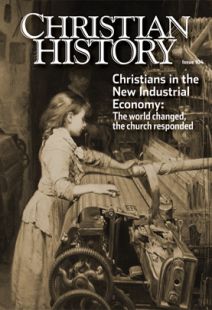The economy of God
IN THE NINETEENTH CENTURY, when factories drew workers away from the countryside and the moral boundaries of ancient agricultural traditions, many lived in squalid conditions and drank horrendously. Most employers didn’t take much care of them.
One inventor of the modern factory, though, was a Christian entrepreneur. His pottery works succeeded because he treated workers with dignity, providing them with clean houses, medical care, and better wages—and firmly cracking down on alcohol use, absenteeism, and laziness. His endeavor was more productive because it was more humane; it was also more humane because it was more productive.
Here’s the twist: that pioneering entrepreneur was Josiah Wedgwood. If you’ve heard of him, it’s likely because of abolitionism. But where did he get the money and cultural prestige to fight slavery? He put his Christianity to work in a better way to do business. He knew slavery was wrong for the same reason he knew how to invent a better factory: he had the vision to see what God wants economics to look like.
Most of human life is taken up by economic work. If we don’t integrate our faith with that part of our lives, we end up with what Mark Greene, a theologian of workplace ministry, calls “leisure time Christianity.”
When dramatic changes in economic structures disrupt the moral signals we are used to from the “old order,” Christians need a fresh vision of how God’s providential care of the world takes place through our work, and how the Gospel can be manifested in our moral witness to the economy at large. “Economy,” after all, was originally oikonomia—a Greek word, often translated as “stewardship” in the New Testament, used for both the church’s Gospel life and the management of the city treasury. Later Christian writers used the term to mean how God divinely orders the universe and how the church orders itself in response.
Today we’re living through an era of economic dislocation. We have to rediscover the perennial truth that the economy is a moral system, a web of human relationships in which each person’s work benefits others through a vast system of exchange.
We need a new generation of entrepreneurially minded business leaders who use their Christian perspectives to identify better ways to operate. We need pastors and church structures to form, train, and prepare us to live out Christianity in the earthly oikonomia. And we have slaveries to fight: debt, cronyism, greed, fraud, dependency, materialism, and a host of injustices that deny people the opportunity to earn their own success in the economy through their work.
This task will be neither fast nor easy. But inventing the modern factory and abolishing slavery were no walks in the park, either. There are promising signs that more and more Christians today hear this call and are ready to answer it. And “the Spirit and the gifts are ours through him who with us sideth.” CH
By Greg Forster
[Christian History originally published this article in Christian History Issue #104 in 2013]
Greg Forster, PhD, is the author of five books and a program director at the Kern Family Foundation.Next articles
Industrialization: Recommended resources
There is no shortage of resources that recount how industrialization changed the world and how the church responded. Here are a few recommended by CH staff and this issue’s authors to help you navigate the landscape
the EditorsPleading the Cause of Christ
In the Prefatory Address to his Institutes, John Calvin defends both his doctrine and its battered believers.
John CalvinSlaughter, Mayhem, & Providence
How one of France’s greatest poets made sense of the Huguenot tragedies.
Alan D. SavageHuguenots and the Wars of Religion: The Gallery — The Inner Circle
Huguenot intrigues swirled around a handful of key figures.
Emily Alger; Matt Donnelly; Reagan White



